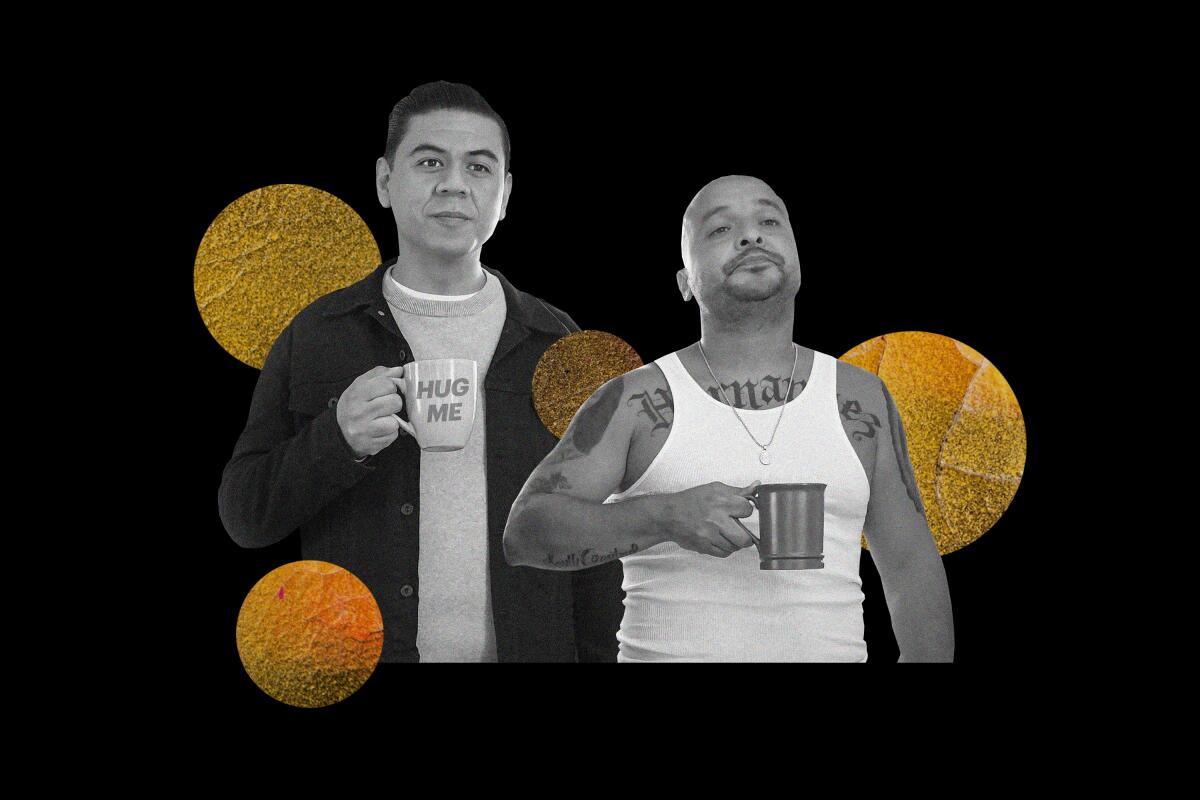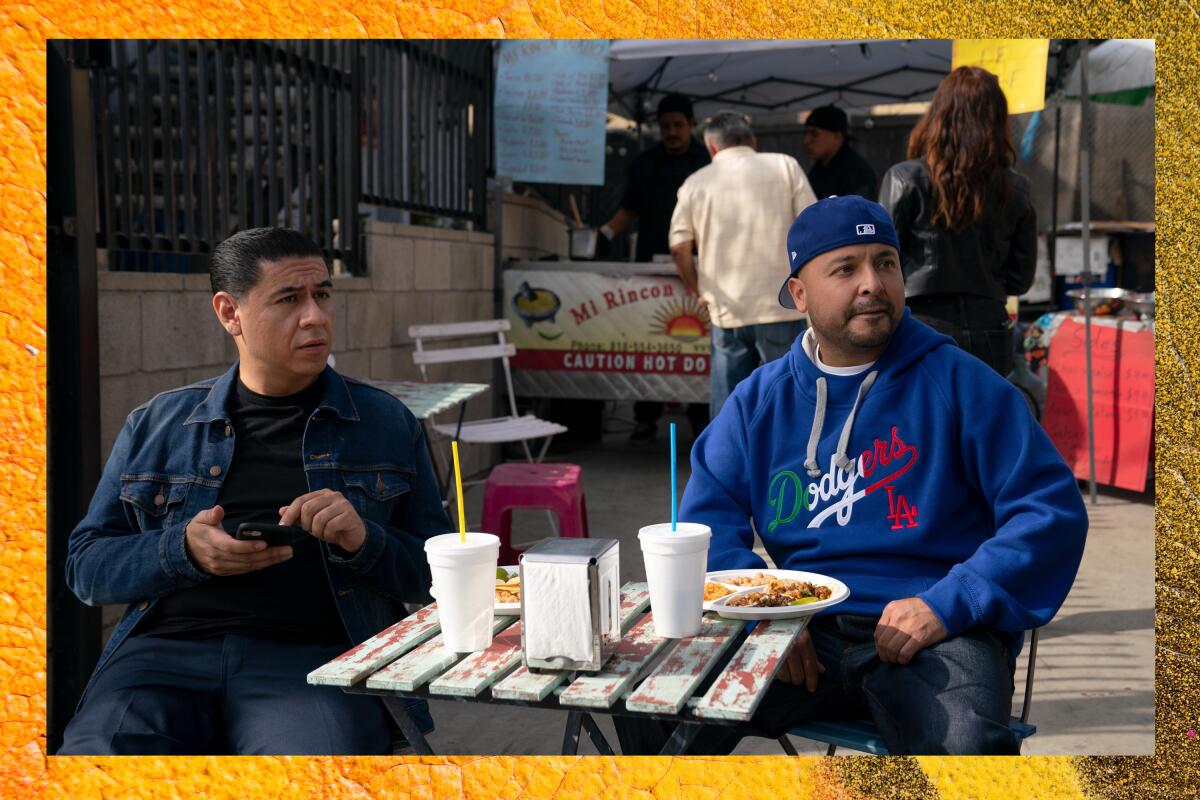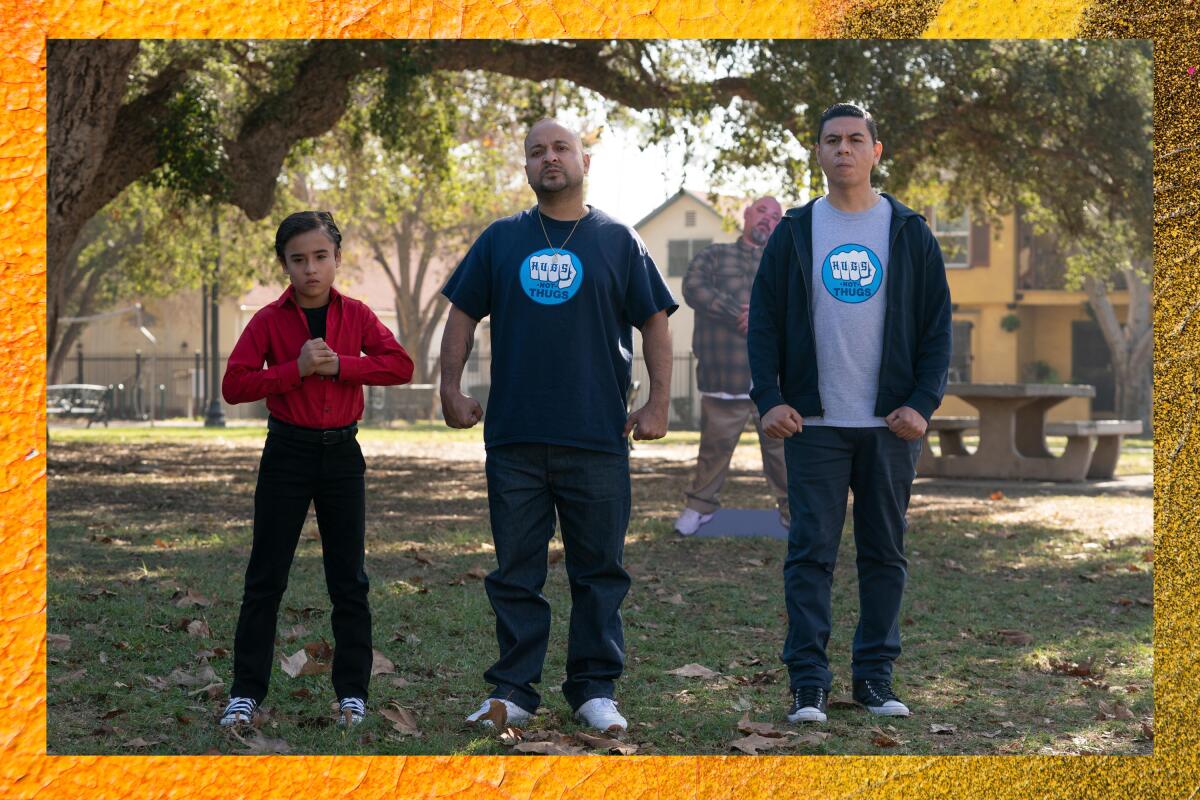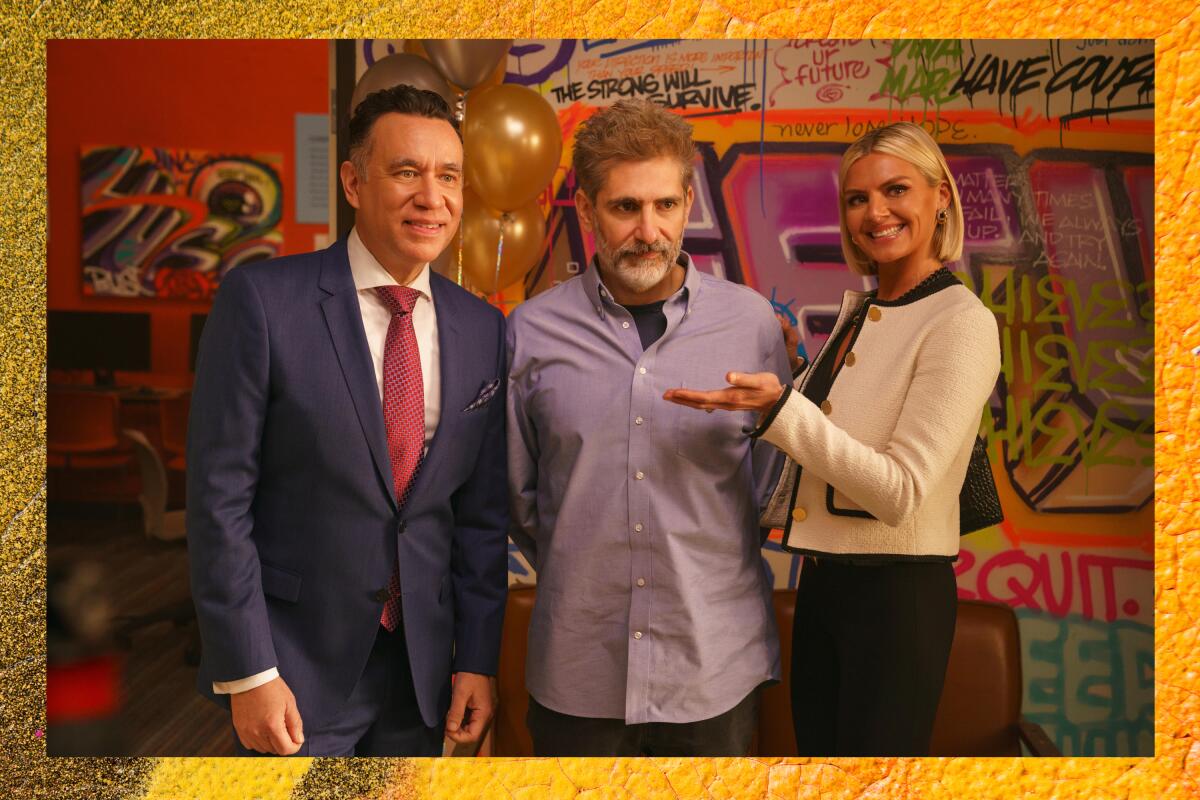Latinx Files: A conversation with ‘This Fool’ co-creator and star Chris Estrada

- Share via
I’ll be honest, when I first saw the trailer for “This Fool,” the new Hulu comedy released on Aug. 12, I cringed a little. I immediately told myself that there was no way a show seemingly about cholos and gang life was for me. I didn’t need 10 30-minute episodes of “Foos Gone Wild.”
But given the subject matter of this newsletter, I felt it was my obligation to give it a watch. I’m glad I did because my initial knee-jerk reaction was very wrong. It wasn’t what I expected.
It was better.
As my colleague Robert Lloyd described it in last week’s edition of Screen Gab (sign up for that awesome newsletter here), “This Fool” is a “sweet, funny, sometimes rowdy comedy set in South L.A.” that follows the misadventures and pendejadas of cousins Julio and Luis Lopez. Julio (played by Chris Estrada, the show’s co-creator) works at Hugs Not Thugs, a gang rehabilitation center, where Luis (played by Frankie Quiñones, who was profiled by Ali Lerman earlier this month,) is now enrolled after spending nearly a decade in prison.
The show is hilarious. It’s silly and dumb, so much so that the days after its premiere, my friends and I kept quoting it in the group chat. If you haven’t, do yourself a favor and carve out time to watch it. You’ll thank me later.
I spoke with Chris Estrada for this week’s newsletter. Below you’ll find our interview, which has been lightly edited for clarity and condensed for space.
The Latinx experience chronicled
Get the Latinx Files newsletter for stories that capture the multitudes within our communities.
You may occasionally receive promotional content from the Los Angeles Times.
What has been the reception so far?
The reception seems to be really good. Like what I’m really appreciative of is that there seem to be two types of people who comment on the show, which they either go, “This is really funny” or people are like, “I really like the nuances and the writing is a lot smarter than it appears.” And you know, they pick up on the more nuanced commentary of the show, which is nice. I really like when that’s not overlooked.
That latter point is definitely something that really struck me about “This Fool.” When it comes to Latinx media, there’s usually hesitance from audiences because the stuff that’s been on television has historically been stereotypical or very “afterschool special,” which to me dissuades people from enjoying a show because it feels like they’re being lectured. Your show very much lacks that, which felt refreshing.
A lot of that came from trying to write a show that didn’t just feel funny but also smart. I think there’s a way to be both, you know, smart and funny. A general audience can like cerebral entertainment, which I think at times the show is cerebral.
A lot of that came from also just being inspired by a lot of films — me and the showrunners, we love films. The goal was to make the show look like a film because comedies are great when they’re cinematic-looking and they have a cinematic aesthetic. I was also really inspired by this movie called “Killer of Sheep” [1978], a movie that was made by a Black filmmaker named Charles Burnett. It’s about working-class Black life in Watts during the late ‘70s. I remember listening to an interview with him years ago. He grew up in that neighborhood and he [said something like], “I just wanted to show it without judgment. I don’t want to have a critique on whether this is good. I don’t want to have a critique on whether this is bad.”
That really fascinates me, you know? The main character is this guy named Stan who works at a meat factory nearby Watts, and he has existential dread and depression. That was a big inspiration. It was cool to see that kind of cerebral character in the hood.

)
One thing I enjoyed about “This Fool” beyond the sophomoric humor, which everybody loves and it’s what my buddies and I keep joking about in the group chat, is that it highlights a version of Los Angeles that is very working class. It’s largely different from the traditional glitzy and superficial representation the city gets in the media.
A lot of that stuff came from things in my own life that I thought people could relate to. Like, if your mom doesn’t have enough money to fix the roof, what do you do? Pones una lona over the roof. I thought little things like that would not just stand out or resonate with working-class Angelenos, but probably working-class people everywhere. I have this friend who’s a comedian. He’s a white guy from the South who comes from a very working-class background, and he sent me a photo of himself putting a blue tarp over his parents’ roof. I’m glad that looking at things through the lens of the working class is resonating with people.
Consider subscribing to the Los Angeles Times
Your support helps us deliver the news that matters most. Become a subscriber.
“This Fool” has largely been framed as a comedy about an odd couple, but it’s really a show about two people who might seem very different but actually share a lot of similarities. After all, they’re both trying to figure out their place in this world.
Luis is definitely trying to after being institutionalized. And then I think Julio.… You know, somebody told me, “Oh, he’s the odd man out,” and I don’t know [if I agree with that]. There’s nothing rare about him. This concept that he’s the odd man out in his neighborhood is ridiculous. I’m not rare. If you go to Compton or South Central or Inglewood or East L.A. or any of these working-class neighborhoods, I’m not rare at all. There are a lot of people just like me who consume certain types of media or certain types of art.
Julio is an archetype. It’s very subtly done.
Yeah, we didn’t want to be preachy about it.
Right. You see it in band T-shirts too. Like, I also listened to Los Crudos. But there are certain moments where you see yourself reflected in these characters. For me, the birthday episode hit a little too close to home because I hate my birthday. This year, I even deleted my Facebook account just so I wouldn’t get any messages.
You know what? I do that too. That’s actually where that came from. We just wanted to show someone like the “Killer of Sheep” characters, somebody who is a working-class guy and who lives in a working-class neighborhood and he’s existential. If you’re not happy about where you are in life, why would you want to celebrate another year gone by? I just don’t like that attention on my birthday. I get massively depressed.
I know this sounds like a backhanded compliment, and I really don’t mean it that way, but it was sort of surprising how much I enjoyed the show, and I think that has a lot to do with the broader landscape of Latinx representation in Hollywood. How much pushback did you get in terms of wanting to make something that felt as authentic as possible?
To be honest, not really. The word “representation,” I know what it means but I don’t know what it means at the same time. For example, when I was a kid, if I would watch [the sitcom] “George Lopez,” I thought it was funny but I didn’t look at it as representative of my life because my mom doesn’t speak English and I didn’t live in a home that looked like that. I just looked at it as funny.
I think a lot of it comes from not being concerned necessarily with representation in that classic identity type of way. It was more looking at it like, “How can I be honest in my life and my experiences?” And, you know, they didn’t give me much pushback. If I could justify it and say that a certain thing is something I experienced or my family experienced, they would say OK. I told them the mom and grandma characters shouldn’t speak English — or if the mom does, it’s not to her children, it’s at work. They asked why, and I told them that my mom doesn’t speak English, and if she doesn’t speak English, then my grandma definitely doesn’t either. I explained to them that my mom’s not a Chicana. I don’t even know if she knows what that really means. She’s an immigrant.
I also wanted to be reflective of what neighborhoods like Inglewood and South Central and Compton feel and look like. In these places, you grow up with Black neighbors, so I thought there should be a Black presence in the show. That didn’t come from necessarily being righteous. It came from a place of honesty. If we have a neighbor character and we see them on the show — like in Episode 6, “Los Botes” — let’s have them be Black because my whole life I’ve always had Black neighbors. I went to school with Black kids.
To [the studio’s] credit, they were really open-minded and they heard us. They never judged or gave us pushback on how I wanted to make the world more authentic because they can’t really question you on your own experiences.
Since we’re talking about representation, you obviously didn’t go out there with the intention of saying, “This is what all Mexican families are like!” But “This Fool” definitely feels very Mexican. There are elements that speak to the broader diaspora. Take the First Communion episode. I think that’s the first time I’ve ever heard a Ramón Ayala song [Puro 956 cuh!] in an American sitcom. That really sticks with you.
I wanted it to be unapologetically itself.
I mean, look, I’m a hater myself and I dissect everything. I’m a stand-up comedian, and stand-up comedians, at least the ones I like, sometimes come from a cynical place, you know? So I get it. With that said, I wanted the show to unapologetically be what it is. I want it to unapologetically feel Black and Latino. I wanted it at the same time to unapologetically feel Mexican, and a specific kind of Mexican. I’m not second generation and my mom’s a janitor. She just retired. I wanted to unapologetically be honest about those facets of my life.
When it comes to that episode, I just thought, “Well, if we can get a Banda Recodo song in there, let’s do it!” We had a Banda Recodo song in there, a Ramón Ayala, and even the birthday episode, we close it out with “Las Mañanitas.”
I think one of the reasons why this show might resonate with people is because it’s working under the assumption of: “Oh, we’re just Mexican and we don’t have to do anything to prove that, so we’re just going to focus on the dumb humor.”
Yeah, that’s it.
And even some of the humor is very culturally specific. For example, the Julio También bit. It’s so deliciously dumb, but it only works if you understand Spanish.
We just thought people would have subtitles and that we shouldn’t worry about these kinds of things. And, you know, the showrunners who I did the show with [Jake Weisman, Pat Bishop and Matt Ingebretson] love that joke and they’re not fluent Spanish speakers. A lot of it was that we wanted to write comedy that was so silly and so dumb that it was smart.
It was also important to me to have some semblance of commentary. I didn’t grow up with just Mexicans. Aside from growing up with Black people, a lot of my friends were also Central Americans. Having little references in there that didn’t feel try-hard, it was my little nod to them. We did that with the Ronald Reagan episode where he’s in the bathroom and is admitting to having a hand in destabilizing Central America. I thought it would be interesting to have those conversations and be inclusive without being corny.
The show is somewhat of a workplace comedy set in a fictional nonprofit called Hugs Not Thugs. If you’re in Los Angeles, it’s hard not to immediately think of Homeboy Industries.
With the setting of Hugs not Thugs, I think when you see characters that are presented as gang members in TV and film — and they’re mostly minority men — they’re usually doing bad s—. In the show, none of them are ever doing bad things. They’re earnestly trying to change their lives and they have to deal with the bull— coming from Julio or Luis. We wanted to subvert that portrayal.
Homeboy Industries is an amazing organization that I can’t speak highly enough about, so we wanted to make sure that none of it ever felt like we were belittling or satirizing people.

I didn’t really get the feeling that you guys were punching down. In fact, I think that was one of the most refreshing aspects of “This Fool”— it doesn’t punch down. Take the second episode, where we meet Junior, the preteen son of a former gang member who’s really into “West Side Story.” The implication is that he’s gay, or not heteronormative. Given that some types of Latinx humor tend to skew homophobic, it would have been easy to make him the punchline. But he wasn’t. Junior simply is allowed to exist, and we later learn he’s got as much “A Clockwork Orange” in him as “West Side Story.”
That was our goal. How do we make the jokes about Julio or Luis, or just anyone, really? One thing we wanted to strive for was not to belittle the men and women who are trying to change their lives. A lot of what you see is them being earnest and putting up with Luis and Julio, who are going through their own transformation, and making sure that nothing feels like a satirization of organizations that are doing really good work.
I think what really inspired me are these places like Homeboy Industries and Covenant House of California, which does similar work with people who age out of the foster care system.
For example, there’s this bread company —
Dave’s Killer Bread?
Yeah, my girlfriend and I talked about that place a few years ago, and I thought to myself that what they do is really interesting. I liked that a lot. That’s a really cool and righteous thing that they’re doing. I remember when it came to figuring out what they do in the show, and what the organization does, I thought of Dave’s Killer Bread and asked myself, “What if they made cupcakes?”
We were inspired by these organizations and made sure we didn’t satirize them. For me satire is making fun of something, and I don’t think there is anything to make fun of places like these. Sure, they might have their own office humor, but on the surface level, what about them is there to make fun of? They’re doing amazing work, you know? Instead, we focused on how hard it is for them to receive money from people and how hard it is to run an organization like this.

That dovetails nicely into my next question. The two most recognizable actors in the show are Michael Imperioli and Fred Armisen, who play Minister Payne — the organization’s founder — and a billionaire thinking of donating to Hugs Not Thugs, respectively. Armisen is also an executive producer of “This Fool.” Can you tell me how these two came onboard to the project?
I’m a stand-up comedian and I was approached by the showrunners in 2018 about working on something together. At the time, they had a show called “Corporate” on Comedy Central, of which I was a big fan, but I also knew through the comedy scene. We started developing it but it was kind of dead in the water. I was showcasing for Comedy Central and [comedy festival] Just for Laughs, and had some industry buzz, but I wasn’t a household name by any means. In the spring of 2019, one of the showrunners said he was thinking of sending something to Fred Armisen, and asked if I was opposed to that. I said of course not. I was working at a warehouse at the time and I was doing comedy at night. By all means, send it to him.
I thought it was going to maybe take a month or so before we heard back from him. He’s a busy guy, famous and successful. Oddly enough. To his credit, we heard back in like five days. We talked on the phone during my lunch break at my warehouse job and he was really nice. We’d sent him a treatment with some images, and he said it was really interesting, and that it was about a part of Los Angeles that he didn’t know about but wanted to know more about. He said, “How can I help?” So we asked him if he’d be willing to put his name to the project and go to pitch meetings with us. He said yes, and was very generous with his time and feedback.
As per Michael Imperioli, I was having a conversation with a friend and I asked for his opinion on who we should cast for that role. He suggested we offer it to [Imperioli]. I didn’t think there was any way he’d do it, but he got back to us within a week and said, “I really like this script. I really like this project. It’s very human. That’s what struck me. You wrote a very human comedy.”
I had a conversation with him and I explained what I saw the character to be like. I told Imperioli that I didn’t view his character as a white savior. That was really important to me. Oftentimes, when you see these characters on TV that are white and run a nonprofit, there’s a certain condescending nature to them. They tend to have a superiority complex — they can also be nebbish and weak. I was inspired by writers and progressive political commentators like Chris Hedges. He’s not soft-spoken. He’s angry and passionate, and that’s how I wanted this character to feel. He’s part of this world. He is as flawed as everybody else and he’s passionate in his own way. He has an anger to him, and I wanted that anger to not only feel real but also maybe, maybe have some humor to it.
Suavecito or Layrite?
The world may never know.
My final question: How low-key glad are you that the show wasn’t released during Hispanic Heritage Month?
[Laughter.]
Oh, that’s so funny. Hispanic Heritage Month cracks me up because it’s like it’s half of September and October. It kills me. But yeah, I’m glad they didn’t do that because what I kept telling [Hulu] was to treat this like their other comedies, and they have great shows like “Pen15” and “Ramy.” And I’m not just being a corporate man here. They have some great shows and we asked to be treated like those shows, and they said, “Yeah, fine.”
I’m so happy that was never brought up. Imagine if it came out like that. We come out in the middle of it, like on September 30. That would have killed me! That stuff is so cringe it makes me laugh. I almost wish that would’ve happened. You don’t, but it’s so funny that what if it did?
The Latinx experience chronicled
Get the Latinx Files newsletter for stories that capture the multitudes within our communities.
You may occasionally receive promotional content from the Los Angeles Times.







